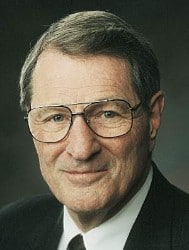
“When something is wrong, increasing its commonality cannot really confer respectability.”
Quotes By Elder Neal A. Maxwell
Elder Neal A. Maxwell served as a member of the Quorum of the Twelve Apostles from 1981–2004. Among others, Elder Maxwell’s most prominent books are All These Things Shall Give Thee Experience, Not My Will, but Thine and the Neal A. Maxwell Quote Book. Maxwell was known for his great mind and ability to articulate his thoughts elegantly.

“When something is wrong, increasing its commonality cannot really confer respectability.”

When spiritually aligned, a poise can come, even when we do not know “the meaning of all things.” (1 Ne. 11:17) Such contented assurance produces not arrogance but quiet acceptance, which is its own form of being “anxiously engaged” but without all the bells and whistles (D&C 58:27; see also D&C 58:28).
However, this spiritual contentment rests on our accepting the Atonement of Jesus, because we “have come to a knowledge of the goodness of God, and his matchless power, and his wisdom, and his patience, and his long-suffering towards the children of men; and also, the atonement which has been prepared from the foundation of the world” (Mosiah 4:6).
Again, brothers and sisters, seeing Alma move from wanting to be a “trump” to being a humble “instrument” and from wanting to “shake the earth” to “perhaps [bringing] some soul to repentance” is a stunning transition! (See Alma 29:1.) Furthermore, isn’t it wonderful that we are permitted to grow, whether that growth is expressed in the space of nine verses or in a lifetime?
| “Content with the Things Allotted unto Us,” Ensign, May 2000, p. 72

“Discouragement is not the absence of adequacy but that absence of courage.”

“Daily hope is vital, since the “Winter Quarters” of our lives are not immediately adjacent to our promised land… Those with true hope often see their personal circumstances shaken, like kaleidoscopes, again and again. Yet with the “eye of faith,” they still see divine pattern and purpose.”
| Brightness of Hope, Ensign, Nov. 1994

“(Cheerfulness is) a deep trust in God’s unfolding purposes—not only for all of mankind, but for each of us as individuals.”
| “But a Few Days” (address given to CES Religious Educators, Sept. 10, 1982), 4.

“The costs of discipleship cannot be paid at wholesale rates nor in one lump sum.”
| Men and Women of Christ, p. 24

| Things As They Really Are, p. 56

“If we will keep our covenants, our covenants will keep us spiritually safe.”
| Ensign, May 1987, p. 71

“I believe it was George Macdonald who reminded us that the only door out of the dungeon of self is the love of one’s neighbor. How proud we ought to be, in a quiet way, that we are members of the church of the most selfless being who ever lived. How proud we ought to be to belong to a church that makes specific demands of us and gives us specific things to do and marks the strait and narrow way, lest we fall off one side of the precipice or the other. I am so grateful that God loves us enough to teach us specifically. Had secularists written the Ten Commandments, they might have said, “Thou shalt not be a bad person.” Note what the Ten Commandments say: “Thou shalt not steal, thou shalt not covet, thou shalt not take the name of the Lord thy God in vain, thou shalt not commit adultery,” and so on. The gospel of Jesus Christ is specific because God cares specifically for each of us and, caring for us, will mark the way carefully lest we fall out of happiness.
“A vague creed is fitted only for a vague God. We have a Father who loves us specifically and gives us things to do and, because he loves us, will cause us, at times, to have our souls stretched and to be fitted for a better world by coping with life in this world.
“May God bless us with that kind of commitment, with the capacity to be serious disciples and to accept both the agendum that he has prepared for each of us because he loves us and the curriculum, prepared for each of us, which he has customized to teach us the things we most need to know, because he loves us.”
| “But For a Small Moment,” BYU Fireside, September 1, 1974

“Many in the world hold back from making the ‘leap of faith’ because they have already jumped to some other conclusions — often the conclusions of Korihor, which are: God never was nor ever will be; there is not a redeeming Christ; man cannot know the future; man cannot know of that which he cannot see; whatsoever a man does is no crime; and death is the end. (See Alma 30:13-18.) The number of modern-day adherents to the Korihor conclusions will grow.”
| “The Inexhaustible Gospel,” Ensign, April 1993, p. 71